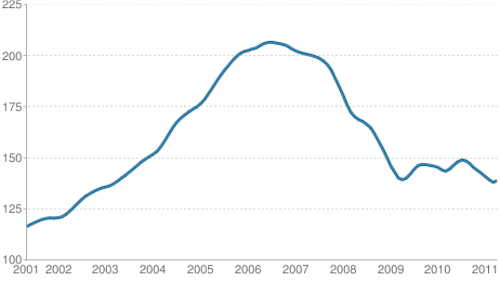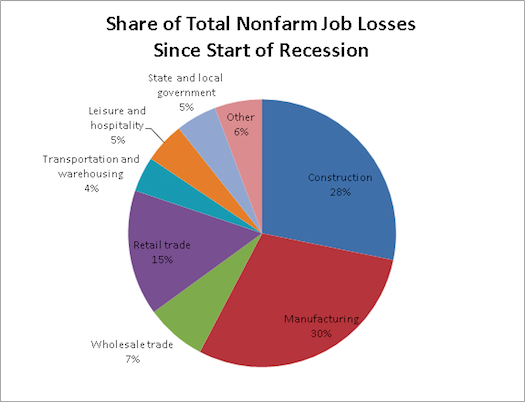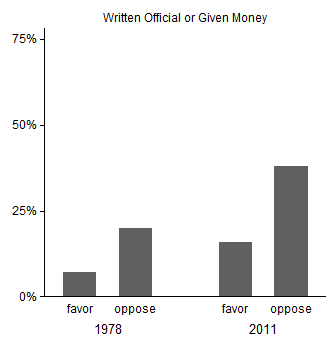Matthew Yglesias's Blog, page 2258
June 29, 2011
Case-Shiller Index Moving Sideways
Here's the latest update to the Case-Shiller home price index:

What I think is interesting about this is that while we clearly are staying well-below peak, it also looks to me like there's no real reason to think we'll revert all the way to the index level of 100. It looks, in other words, like we had a lot of irrational exuberance and that we also did have an upward transformation in the equilibrium price of a home. The transformation, I suspect, would be driven by the increasing quality of life in a number of supply-constrained metropolitan areas (most notably the San Francisco/San Jose, Greater New York, DC/Baltimore, and Greater Boston Consolidated Statistic Areas). There's a story here about real estate prices, but also about the general phenomenon of financial bubbles. Looking at something and saying "This is out of whack" is much, much, much easier than figuring out exactly how out of whack it is or when the out-of-whackness will peak. We need systems that are more resilient to bubbles, but it's unrealistic to think we're going to build systems that are based around detecting and popping them.


First Party-Crossing Judge To Rule On Affordable Care Act Upholds Its Constitutionality

Judge Jeffrey Sutton
As my colleague Ian Milhiser says the "most important part of today's Sixth Circuit decision upholding the Affordable Care Act isn't what the court said … the most important part of today's decision is who made it."
The best way to get at the significance of this is just that thus far we've seen moderate-and-progressive Democrat-appointed judges uphold the law and conservative Republican-appointed judges strike it down. Today's decision from Judge Jeffrey Sutton breaks that pattern. Sutton is a Republican. And not some kind of weird holdover from Gerald Ford, not some mistake made by Ronald Reagan, not a compromise candidate offered by George H.W.Bush, but a former Scalia clerk who was nominated in 2001 by George W Bush. Senate Democrats made sure he didn't come up for a vote at that time, but after the GOP win in the 2002 midterms he got his vote in 2003 and secured confirmation by a relative narrow 52-41 vote. Only two Democrats voted for him. He is, in other words, an orthodox conservative. And his voice here not only confirms the constitutionality of the law, but the obvious constitutionality of the law. There's a lot of serious disagreements in American constitutional law, but whether or not the US Congress has the authority to create social welfare programs and regulate the health insurance industry isn't one of them.


Laying A Marker On Obama And The Jews
In response to Ben Smith's article reporting on continuing qualms about Barack Obama among Jewish Democrats who wish he was more of a yes-man to Bibi Netanyahu, I'm inclined to say that if Jewish Dems abandon Obama en masse for Michele Bachmann, I'll eat my hat.
But I thought a bit better of it. Barack Obama got 53 percent of the vote in 2008. Bush got 51 percent in 2004. Gote got 48 percent in 2000. Clinton got 49 percent in 1996 and 43 percent in 1992. Even Ronald Reagan only got 51 percent in 1980. Which is just to say that it's extremely likely that Obama will do worse in 2012 than he did in 2008. And really, who out there isn't at least a bit displeased with the outputs of the Obama administration relative to our fondest hopes and dreams from the 2008 campaign? So the question when you're looking at Jewish support for Obama during his re-election campaign isn't "do fewer Jews like him than did in 2008;" it's is there a disproportionate trend toward Jewish abandonment of Obama. I haven't seen any clear evidence of such a trend, but this is the thing to look at. And the same goes for other demographic sub-groups. I read sometimes that Obama has lost Hispanic support, which I don't doubt. But has he lost more Hispanic support than white support? More than Jewish support? If you preside over years of mass unemployment and need to make a variety of tough calls about issues and priorities, you're bound to lose support.


Do Incentives Shape Teacher Behavior Or Don't They?

Picking up a thread again from last week, Dana Goldstein says there's a difference between testing and test-based accountability and uses as an example a teacher who constructed a particularly inane-sounding poetry lesson on the theory that this would help kids do well on the Maryland School Assessment. She concludes that "when testing policies are set up to punish adults, educators are incentivized to raise test scores at any cost, not to use tests to help better instruct children."
Here, again, I run into what I think is a huge consistency problem in the messaging coming out of teachers unions. Sometimes I hear from union-affiliated folks that it's unfair to attribute differences in student learning to differences in teacher skill, because everyone knows that socioeconomic and home environment factors drive a lot of this. Other times I see the American Federation of Teachers building a messaging program around the idea that its members are Making A Difference Every Day. To me this leads to the obvious conclusion that while socioeconomic and home environment factors do drive a lot of student learning, teachers are also making a difference every day. And it makes a lot of sense to ask which teachers are making the most difference. The teachers who are in the top 20 percent of difference-makers are playing a vital role to the future of America, and we ought to pay them more money and make sure they don't leave the profession. But the teachers who are in the bottom percent of difference-makers are doing us little good, and we should try to replace them with other people.
Of course to do that, you need to measure student learning and that means tests. But now comes out the worry that educators are now "incentivized to raise test scores at any cost" and will become soulless stat-juking monsters. If this is true, though, then what happens is teachers are given zero financial incentive to perform well on the job. What if the only financial incentives teachers get are to obtain meaningless degrees and stick around long enough for pensions to vest? It's fun to speculate on the extent to which educators are or aren't driven by objective financial incentives, but you need a consistent psychological theory of the case. The hypothesis that a teacher who responds to an incentive-free system is going to have a highly effective pedagogical method that he then abandons in favor of pure score-gaming once faced with an incentive to get students to do well on tests doesn't make sense. Something nice about Bad Teacher is that it portrays this correctly — the teacher disposed to respond badly to test-based incentives is the same person as the person disposed to respond badly to an incentive-free environment.
My own take is that talk of incentives is massively overrated. Baseball teams don't pay a premium to guys who hit lots of home runs in order to create "incentives" for people to hit home runs. If that worked, we'd all be major league sluggers! Baseball teams pay a premium to guys who lots of home runs because home run hitters are valuable contributors to baseball teams. Hitters who perform worse are less valuable. And hitters who perform very poorly are drummed out of MLB. That's not really about incentives; it's about attracting and retaining high performers to your organization.


BREAKING: 6th Circuit Upholds Constitutionality of Affordable Care Act
The majority writes: "We find that the minimum coverage provision is a valid exercise of legislative power by Congress under the Commerce Clause and therefore AFFIRM the decision of the district court." Key passage:
By regulating the practice of self-insuring for the cost of health care delivery, the minimum coverage provision is facially constitutional under the Commerce Clause for two independent reasons. First, the provision regulates economic activity that Congress had a rational basis to believe has substantial effects on interstate commerce. In addition, Congress had a rational basis to believe that the provision was essential to its larger economic scheme reforming the interstate markets in health care and health insurance.
Judge Jeffrey Sutton, one of the judges who voted to uphold the act, clerked for Scalia, and was nominated by George W. Bush.
Check out a detailed analysis of the decision here.


America's Sectoral Shift Toward Idleness And Low Output
Something you continue to hear is that elevated unemployment is somehow just part and parcel of the fact that the economy is transforming over time because of trade flows, technology, demographics, consumer preferences whatever. This is wrong. Not because the transformations aren't happening, but because they're always happening. From 1995-2000 we had extremely robust economic growth not despite technological change but because of it. China was growing rapidly during that time, they were growing rapidly during the shallow recession of 2001, they were growing rapidly during the weak but sustained recovery after that, and they continued growing rapidly through the recession. Change is a constant, which is also what makes conservative prattling about "certainty" so odd.
Here courtesy of Matt Cameron is a pie chart showing which sectors have accounted for what shares of job losses since the recession began:

It's difficult to tell a coherent story about this as a question of shifts. Retail sales are down. Maybe that's because people shop on the internet more. But if people are shopping on the internet more, then employment in transportation should be going up. Or maybe employment in transportation is going down because someone invented a robot truck that's displacing truck drivers. But if that were true (which obviously it isn't) then we should have more manufacturing employment as we rapidly replace our existing supply of non-robotic trucks. It used to be that the PRC government was buying a lot of mortgage backed securities and this was leading to low mortgage interest rates that drove demand for new housing and thus employment in the construction sector. Then this demand for new single-family homes dried up but the PRC kept buying bonds. So with interest rates at historic lows, why not borrow money and pay these construction workers to build new schools?
Conversely, you can imagine a story in which over the long run fewer Americans make things (either houses or homes) because robots and Chinese people do it. In that case, we'd all have tons of stuff and spend more time at fancy restaurants and going on vacation. But leisure and hospitality employment are down. Or maybe we'd hire tons of new cops and preschool teachers. But state and local employment is down. We're not retailing and we're not wholesaling. We're not making things and we're not shipping things. This isn't a "fundamental change" away from doing one kind of thing to doing another kind of thing. It's a fundamental change away from producing goods and services to mass unemployment and reduced living standards.


Obama Dodges Question On Constitutionality Of Debt Ceiling As Senators Start Raising Doubts
On the very same day that we finally saw some senators broach the constitutional objections to the debt ceiling, President Obama got a multi-part question from Chuck Todd that touched on this and he just ducked it. Keeping his options open? I hope so.


Taking Action Matters
Something I like to ask people who are disgruntled with the performance of the political system is what have you, personally, done about it? When was the last time you wrote or called your member of Congress? Can you even name the people who represent you in the state legislature and have you written or called them? Howard Schuman with a detailed study of whether or not people should be required to get a police permit before they can buy a gun (via Jon Sides) illustrates the importance of such things. In 1978, such a permit requirement was favored 65 percent to 42 percent. By 2011, support had dropped somewhat but it was still popular, 57 percent to 43 percent. So why don't gun controllers win? Surprisingly, it's not preference intensity as measured by asking people if they feel strongly about the issue. Nor is it preference intensity as measured by asking people, "How important is a candidate's position on permits for guns when you decide how to vote in a Congressional election?"
Instead, where the gap shows up is in people's observed behavior:

A lot of people I know are skeptical of the value of calling or writing your member of Congress. After all, why would members of Congress care about such things when scientifically valid opinion surveys are available and few members face competitive elections anyway? Surely, congressional action is determined by some combination of public opinion as measured in polls and corruption via lobbyists. So if members don't do the popular thing, it must be because the system is corrupt.
I doubt it. For one thing, it's unquestionably the case that members of Congress dedicate a lot of staff time to fielding phone calls and reading and coding pieces of mail. And anecdotally, things like the huge "letter gap" over the Waxman-Markey energy reform bill had a huge psychological impact on the Hill. Then you have research like this. So I do wish everyone would say to themselves, "If I care enough about this issue to complain about it in conversation, then I'd better care enough about it to get in touch with the elected officials who represent me."


Lessons From The Greek Austerity Vote

A few points on the Greek austerity package that passed today. One is that this is a real austerity package seriously designed to reduce the Greek budget deficit. That means, yes, cutbacks in government spending. But it also means big tax increases. That's because when you're genuinely seized with terror about the need to reduce the deficit, you need both more revenue and less spending. The proposals being floated by congressional Republicans for spending cuts plus extensions of the Bush tax cuts aren't austerity programs, they're programs to make tax cuts for the rich affordable by reducing spending.
A related point is that sensible and self-interested politicians don't normally vote for a giant package of spending cuts and tax hikes. That's unpopular stuff. The Greeks were being forced into it by powerful forces. Financial markets are charging exorbitant rates for Greek borrowing. There's no way they can pay what they owe absent a bailout. And the only way to get the bailout is to agree to austerity. They had a gun to their head. The only alternative to austerity would be a default that would lead to bank runs, the collapse of the Greek financial system, Greece's humiliating ejection from the euro, and years of semi-isolation from global financial markets. Even more astounding, notwithstanding all of the above there's a very credible argument that Greece's politicians are doing the wrong thing here and choosing respectability for themselves amongst the global elite over the real objectives of its population.
Now compare all this to the United States. Interest rates are not only not spiking, they're at historic lows. There's no need for congress to enact an unpopular mix of spending cuts and tax hikes. If Republicans don't want to increase revenue and Democrats don't want to gut entitlement programs, then there's excellent news since for now there's no need to do either. Just raise the debt ceiling and we can move on.


Debt Limit Delay Would Likely Force Cuts In Programs For Seniors

Richard Wolf for USA Today has a useful look at what kind of immediate program cuts we'll be looking at if Congress doesn't agree to raise the debt ceiling in a timely manner. Long story short, the Treasury Department will be facing difficult choices between slashing programs for seniors and trying to run wars without paying the people doing the work of keeping armies in the field:
It shows that in August, the government could not afford to meet 44% of its obligations. Since the $134 billion deficit for that month couldn't be covered with more borrowing, programs would have to be cut.
If Social Security, Medicare, Medicaid, unemployment benefits, payments to defense contractors and interest payments on Treasury bonds were exempt, that would be all the government could afford for the month. No money for troops or veterans. No tax refunds. No food stamps or welfare. No federal salaries or benefits.
Want to protect the social safety net? That would be possible — but only if Treasury stopped paying defense contractors, jeopardizing national security. Plus virtually every federal agency and employee.
The best way to handle this, in the first instance, is to pay contractors with IOUs. The firms that supply the United States military aren't cash-constrained and they don't want to give up the Pentagon as a customer. If we ask them to keep doing the work and just promise to pay them after congress raises the debt ceiling, they'll almost certainly keep paying the troops. And on a symbolic level, the high-level officials of the Obama Administration can agree to work without pay even though this won't save very much money. Failing to pay out tax refunds, Social Security benefits, food stamps, and other cash and cash-like transfers would, by contrast, be catastrophic leading to the kind of historic collapse in nominal economic activity that Michael Ettlinger and Michael Linden have warned against. The better option is to stop paying doctors and hospitals who treat Medicare and Medicaid patients, and hope that most health care providers are willing to keep doing work and accept delayed payments. The hope would have to be that after a week or two of this, the various government contractors and health care providers who are losing money would twist Congress' arm enough to get the debt ceiling increased. But if that doesn't work, then you need to start looking at only partially paying troop salaries, Social Security benefits, and civilian federal employee salaries. At that point, the consequences for the macroeconomy start going from "uncomfortable" to "potentially catastrophic" because people who aren't getting paid aren't going to be able to buy goods and services from others, kneecapping private sector employment.


Matthew Yglesias's Blog
- Matthew Yglesias's profile
- 72 followers



